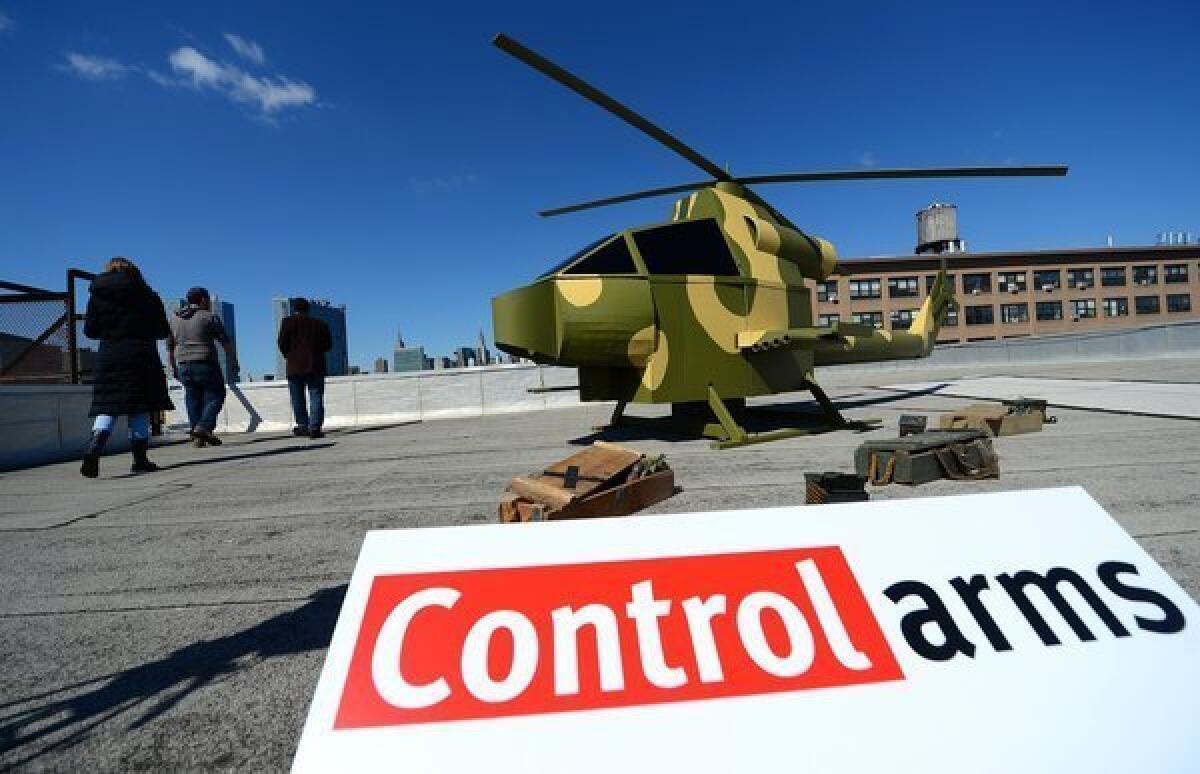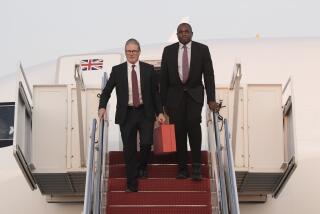Global arms trade treaty still has a shot, backers say

A groundbreaking pact to regulate the global weapons trade still has a chance of success after Iran, North Korea and Syria blocked the draft treaty at the United Nations this week.
But even if the treaty passes, its power will hinge on how nations that flout it are held accountable.
Under the draft agreement, countries must regulate the flow of weapons and their parts, something that many of them don’t do now. Before sending arms abroad, a country would have to weigh whether the weapons could be used to violate human rights or international humanitarian laws, harm women and children, fuel terrorism or cause other kinds of abuses. Such transfers are supposed to be banned.
“There’s not a blue-helmeted police force that goes in and writes them a ticket” if a country ignores or bends the rules, said Daryl Kimball, executive director of the U.S.-based Arms Control Assn.
Russia, for instance, might continue sending weapons to the Syrian government, something Kimball said would be illegal under the U.N. treaty. But banning such action could at least give more muscle to activists trying to shame them, he said.
“Today we can say it’s irresponsible,” Kimball said. Under the pact, “we could say it’s illegal.”
The agreement also would require countries to share new information about weapons transfers, another tool for rights groups. Equipped with that information and empowered by the new weight of the law, concerned citizens and groups could turn to bodies such as the African Union, the European Union or even the U.N. Security Council to press for some kind of punishment.
The Security Council is much more likely to act if a country is actually violating an international treaty instead of “just behaving in a way that some states find irresponsible,” said Frank Jannuzi, deputy executive director of Amnesty International USA.
Even if the agreement passes after being put to a vote at the U.N. General Assembly -- and is ratified by supporting nations -- Iran, North Korea and Syria will not be bound by it if they vote against it, as they are expected to do. India has also challenged the wording of the treaty; the Times of India reported its U.N. envoy complained that “legal flaws and loopholes” made it unacceptable.
The treaty would then bind only the willing nations, leaving a gap in global regulations. The agreement becomes more effective as “more states sign it and more states actually implement the standards,” U.S. Assistant Secretary of State Thomas Countryman told reporters Thursday. States must draw up their own laws to implement the treaty.
Jannuzi said Amnesty International was dismayed that the agreement did not get the unanimous support it needed to succeed through consensus Thursday. However, “if getting them to sign on would mean watering down this treaty, it may actually be stronger as a result of them opting out,” he added.
The arms trade treaty also stirred up concerns about American gun rights from the National Rifle Assn. and the conservative Heritage Foundation, despite assurances from Countryman and the American Bar Assn. Center for Human Rights said it didn’t threaten the 2nd Amendment.
The latest version of the treaty could be risky because it referred to “end users,” Ted R. Bromund, senior research fellow at the Heritage Foundation, said in a blog post Thursday. “The U.S. had sought to reduce or eliminate the use of this phrase, which can refer to individual firearm owners.”
Kimball said that even if critics convinced U.S. lawmakers not to ratify the new treaty, existing U.S. laws and practices are already consistent with the international rules. Countryman said the treaty would bring other countries closer to the U.S.’ high standards for arms exports.
“I believe it levels the playing field,” Countryman said.
Backers want the U.N. treaty to go to a vote of the General Assembly as soon as it can; a vote is believed to be possible as early as Tuesday.
ALSO:
Brazil clown will leave big shoes to fill in Congress
Ten years after Iraq war began, Iran reaps the gains
After loss, Afghan shadow warrior still wishes to fight Taliban
More to Read
Sign up for Essential California
The most important California stories and recommendations in your inbox every morning.
You may occasionally receive promotional content from the Los Angeles Times.










